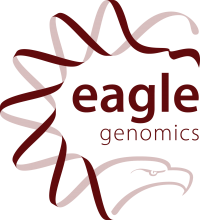| Please visit our ***NEW*** OBF/BOSC website: https://www.open-bio.org/ |
-
Difference between revisions of "BOSC 2010"
(→Sessions: mention of traditional bio* updates) |
(→Sessions: added parentheses) |
||
| Line 29: | Line 29: | ||
** This is meant to provide a challenge for OpenBio contributors, a nice tutorial style overview of various projects and approaches for other programmers, and a fun opportunity to compete and learn from other projects. Conference attendees will vote on their favorite solution, with the winner receiving fame and fortune (warning: fortune not guaranteed). | ** This is meant to provide a challenge for OpenBio contributors, a nice tutorial style overview of various projects and approaches for other programmers, and a fun opportunity to compete and learn from other projects. Conference attendees will vote on their favorite solution, with the winner receiving fame and fortune (warning: fortune not guaranteed). | ||
** Specific challenges are being discussed on the [[SolutionChallenge]] page and through the various Bio* mailing lists. Alternately, each project could highlight a challenge that they particularly do well, focusing tutorial-style on how to solve a particular problem. | ** Specific challenges are being discussed on the [[SolutionChallenge]] page and through the various Bio* mailing lists. Alternately, each project could highlight a challenge that they particularly do well, focusing tutorial-style on how to solve a particular problem. | ||
| − | ** Of course, we would still welcome traditional Bio* Update abstracts, too! | + | ** (Of course, we would still welcome traditional Bio* Update abstracts, too!) |
* '''Approaches to analyzing high-throughput 'omics data''' -- Presentation of projects that use the MapReduce framework either for | * '''Approaches to analyzing high-throughput 'omics data''' -- Presentation of projects that use the MapReduce framework either for | ||
*# parallelized analysis of possibly terabyte size data sets from next-gen sequencing and mass spec proteomics or | *# parallelized analysis of possibly terabyte size data sets from next-gen sequencing and mass spec proteomics or | ||
Revision as of 01:53, 26 February 2010
The 11th Annual Bioinformatics Open Source Conference (BOSC) 2010 will be held for two days in conjunction with the 18th Annual International Conference on Intelligent Systems for Molecular Biology (ISMB 2010) in Boston, Massachusetts, USA. The dates of BOSC 2010 are July 9-10; the main ISMB Conference runs July 11-13, 2010. BOSC attendees are also invited to participate in the Codefest 2010 programming session on July 7-8.
Please see past BOSC conferences for the previous 10 conferences.
Overview
The Bioinformatics Open Source Conference (BOSC) is sponsored by the Open Bioinformatics Foundation (O|B|F), a non-profit group dedicated to promoting the practice and philosophy of Open Source software development within the biological research community.
Many open source bioinformatics packages are widely used by the research community across many application areas and form a cornerstone in enabling research in the genomic and post-genomic era. Open source bioinformatics software has facilitated rapid innovation, dissemination, and wide adoption of new computational methods, reusable software components, and standards. One of the hallmarks of BOSC is the coming together of the open source developer community in one location to meet face-to-face. This creates synergy where participants can work together to create use cases, prototype working code, or run bootcamps for developers from other projects as short, informal, and hands-on tutorials in new software packages and emerging technologies. In short, BOSC is not just a conference for presentations of completed work, but is a dynamic meeting where collaborative work gets done and attendees can learn about new or on-going developments that they can directly apply to their own work.
Important Dates
- February 26, 2010: Call for abstracts opens
- March 9, 2010: Registration opens
- April 15, 2010: Abstract deadline
- May 5, 2010: Notification of accepted abstracts
- May 28, 2010: Early Registration Discount Cut-off Date
- July 7-8, 2010: Codefest 2010 programming session
- July 9-10, 2010: BOSC 2010!
Sessions
- OpenBio SolutionChallenge -- Bioinformatics library providers: please join us in a friendly competition to solve a shared biological problem, demonstrating the utility of your toolkit alongside other developers.
- Instead of the traditional Bio* updates that we've had at previous conferences, this year, we're planning to organize these talks around a central theme: the OpenBio Solution Challenge. We start with a biological question of general interest, and the project talks will focus around how you would solve that problem using your toolkit and programming language.
- This is meant to provide a challenge for OpenBio contributors, a nice tutorial style overview of various projects and approaches for other programmers, and a fun opportunity to compete and learn from other projects. Conference attendees will vote on their favorite solution, with the winner receiving fame and fortune (warning: fortune not guaranteed).
- Specific challenges are being discussed on the SolutionChallenge page and through the various Bio* mailing lists. Alternately, each project could highlight a challenge that they particularly do well, focusing tutorial-style on how to solve a particular problem.
- (Of course, we would still welcome traditional Bio* Update abstracts, too!)
- Approaches to analyzing high-throughput 'omics data -- Presentation of projects that use the MapReduce framework either for
- parallelized analysis of possibly terabyte size data sets from next-gen sequencing and mass spec proteomics or
- parallelization of bioinformatics algorithms in general (e.g., the Apache Mahout project).
- Projects may involve Hadoop (MapReduce API + HDFS) as well as associated open source toolkits (Hbase, Hive, Pig, Cascading, etc.) or other NoSQL non-relational data stores.
- Cloud-based approaches to improving software and data accessibility -- The emergence of cloud computing has made highly scalable cluster computing available to computational biologists. Services such as Amazon Elastic Compute Cloud combined with publicly available datasets promise to lower the overhead to participate in large scale data analyses. We are interested in talks focused around how the community can build up resources and datasets for cloud infrastructure, as well as the sharing of insights, and the contribution of implemented workflows. Current implementations and initiatives are encouraged to submit abstracts for talks and join in the pre-conference Codefest session.
- The Semantic Web in open source bioinformatics -- Emerging Semantic Web technologies promise to improve data interoperability and accessibility. Seeing these developments as promising for life science researchers who struggle daily with new file formats and incompatible datasets, BioHackathon 2010 focused around current semantic resources and tools for bioinformatics. We solicit
session talks from researchers using RDF and related technologies in their research and data analyses, with a special focus on documenting how these tools can contribute to open data access.
- Open Source Software -- Open source software that does not fit neatly into the above categories.
- Lightning Talks -- short, 5 minute talks intended to introduce very recent developments, initiate discussion, or highlight resources of interest to BOSC attendees. Abstracts for Lightning Talks will be accepted up to the first day of BOSC and will be accepted based on space availability and conformance to the Open Source License Requirement.
Student Travel Awards
Through generous sponsorship from Eagle Genomics and an anonymous donor, we are pleased to announce the competition for three Student Travel Awards for BOSC 2010. Each winner will be awarded $250 to defray the costs of travel to BOSC 2010.
- To apply for the award, submit your abstract by the April 15 deadline through the Open Conference Systems site.
- Be sure to check the box indicating that you are a graduate student.
- Your abstract will undergo the normal review process for BOSC. In addition, the BOSC Organizing Committee will review the student abstracts and pick the three best abstracts for the Student Travel Awards.
- You will be notified of your award by the abstract notification deadline shown above.
- You will still need to make your own travel arrangements for BOSC. The award will take the form of a check or reimbursement to take place at the conference itself. You will receive more details upon notification of the award.
Abstract Submission Information
The deadline for abstract submissions is Thursday, April 15. Abstract submissions will not be accepted via e-mail this year. All abstracts are to be submitted through our Open Conferences System site (coming soon).
Abstracts must be one page in length and submitted as a PDF file only. Please observe the following formatting guidelines
- Use 1 inch (2.5 cm) margins on the top, sides, and bottom of the page.
- List the following elements in order from the top of the page:
- Title
- Authors, with the presenting author's name underlined.
- Author affiliations, including the e-mail address of the presenting author.
- URL for the overall project web site
- URL for accessing the code
- The particular Open Source License being used
- The abstracts will be presented "as is" in the program booklet
- NOTE: upload your one-page, PDF-formatted abstract to the Open Conference System site as the paper. The 50-word abstract referred to in the system is unnecessary since you are uploading your abstract as a PDF file.
Accepted talks will be 10-20 minutes, depending on the session. You will be notified of the length of your talk upon abstract acceptance.
Submissions for Lightning Talks (length ~5 minutes) will be accepted up until the day of the conference, though submission to the program following the above guidelines is strongly encouraged to facilitate better planning. The open-source license requirement (see below) applies equally to lightning talks.
Open Source License Requirement
The Open Bioinformatics Foundation, which is the sole sponsor of BOSC, is dedicated to promoting the practice and philosophy of Open Source Software Development within the biological research community. For this reason, if a submitted talk proposal concerns a specific software system for use by the research community, then that software must be licensed with a recognized Open Source License, and be available for download, including source code, by a tar/zip file accessed through ftp/http or through a widely used version control system like cvs/subversion/git/bazaar/Mercurial.
See the following websites for further information:
Organizing Committee
Chair
- Kam D. Dahlquist (Loyola Marymount University)
Members
- Brad Chapman (Biopython developer; Mass General Hospital)
- Nomi Harris (O|B|F Board)
- Michael Heuer (BioJava Developer)
- Darin London (BioPerl Developer)
- Steffen Möller (Institute for Neuro- und Bioinformatics, Lübeck, Germany)
- Anton Nekrutenko
- Jim Procter (University of Dundee, Scotland)
- Ron Taylor (Pacific Northwest National Laboratory)
Ex Officio (Members of the O|B|F Board)
Contact Us
- If you wish to join the BOSC 2010 Organizing Committee, please send an e-mail to bosc@open-bio.org. Conference planning is being discussed on the Discussion page, you are welcome to add your ideas.
- If you wish to be on the mailing list for BOSC-related announcements, including the call for abstracts and deadline reminders, please subscribe to the Bosc-announce list.
- For more information about the conference, please contact the organizers at bosc@open-bio.org.
Sponsors
The keynote speakers and student travel fellowships to BOSC 2010 were made possible by Eagle Genomics, Ltd. and an anonymous donor. Thank you.

